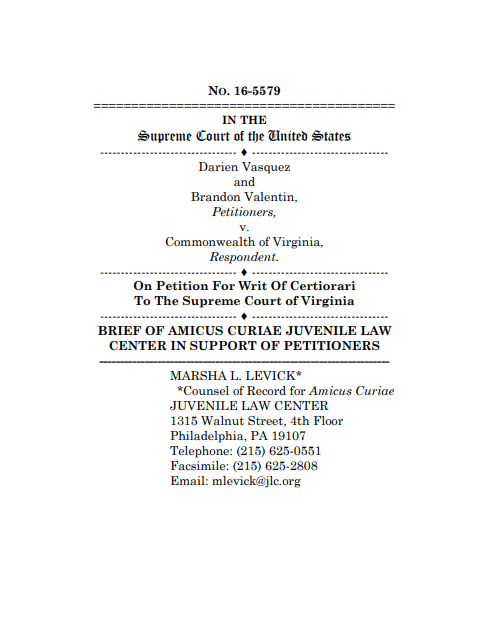
Summary of Argument
In 2010, this Court held in Graham v. Florida, 560 U.S. 48 (2010) that life without parole sentences for juvenile offenders committing nonhomicide offenses violate the Eighth Amendment's ban on cruel and unusual punishments. The Court explained: “The juvenile should not be deprived of the opportunity to achieve maturity of judgment and self-recognition of human worth and potential. . . . Life in prison without the possibility of parole gives no chance for fulfillment outside prison walls, no chance for reconciliation with society, no hope.” Id. at 79. Graham held that a sentence that provides no “meaningful opportunity to obtain release” is unconstitutional. Id.
Petitioners Darien Vasquez and Brandon Valentin were convicted of nonhomicide offenses that they committed as juveniles and received consecutive sentences amounting to 283 years for Vasquez and 148 years for Valentin. Petitioner Vasquez will become eligible for parole after serving 133 years, at age 149. Petitioner Valentin will become eligible for parole after serving 68 years, at age 85. As a practical matter, Petitioners will never become eligible for parole because their sentences exceed their life expectancies. Because Petitioners’ sentences deprive them of a “meaningful opportunity to obtain release,” they are the functional equivalent of life without parole and are unconstitutional despite being labeled as consecutive term-of-years sentences.
The constitutional errors in Petitioners’ sentences are not remedied by Virginia’s geriatric release provision because virtually no prisoners are released under this provision, because life expectancy data indicates that Petitioners will not survive to the age of eligibility, and because geriatric release is not “meaningful” under Graham.
This Court should grant certiorari to resolve the issues of whether consecutive term-of-years sentences constituting de facto life without parole are unconstitutional under Graham and, if so, whether Virginia’s geriatric release statute can remedy this constitutional defect.